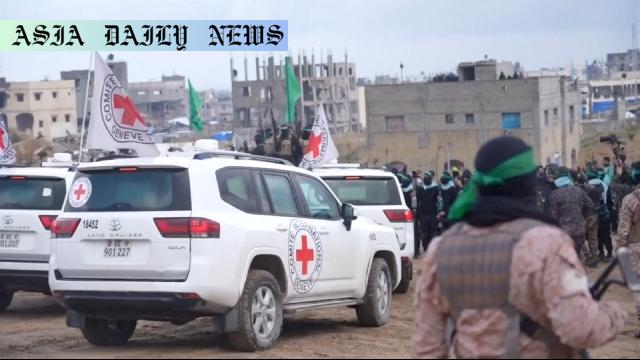Ceasefire: Hamas investigates body mix-up as Israel accuses the group of severe agreement violation amid ongoing hostage releases.
- Hamas is investigating a possible body mix-up under a ceasefire deal.
- Israel raises concerns of an agreement breach due to the incident.
- Six living hostages are scheduled for release by Hamas on Saturday.

Ceasefire Agreement: An Overview
On January 19, 2023, a six-week ceasefire agreement between Israel and the Islamic group Hamas came into effect. This agreement aimed to facilitate the release of hostages held by Hamas in exchange for a halt to ongoing airstrikes and violence in the region. As part of this ceasefire, Hamas committed to freeing 33 hostages and transferring the bodies of deceased individuals.
The Controversial Body Mix-Up
On Thursday, Hamas handed over four bodies to Israel, stating that they belonged to hostages. However, Israel contested this claim, stating that one of the bodies did not match any of the hostages. This alleged mix-up has sparked outrage, with Israel accusing Hamas of violating the ceasefire terms in a severe and unacceptable manner.
In response, Hamas issued a statement asserting that recent Israeli airstrikes may have caused the confusion, with possible mix-ups between the bodies of hostages and those of Palestinians who were in the same vicinity. The group emphasized its commitment to fulfilling its obligations under the agreement and declared its intent to address this issue thoroughly.
Implications of the Mix-Up
This incident has raised tensions amid the fragile peace accord. While Hamas stated its willingness to probe the situation and correct any errors, Israel’s reaction underscores the seriousness of the perceived breach. Trust between the two parties remains a challenge, increasing the complexity of the ongoing negotiations.
Plans for Hostage Releases
Amid the dispute over the body mix-up, Hamas announced its intent to release six more living hostages on Saturday. A list of the individuals set to be freed was submitted to the Israeli side. This move is a part of the broader commitment to release 19 of the initial 33 captives.
The Path Forward and the Expiry of the Ceasefire
With the truce set to expire on March 1, both sides are under pressure to adhere to the terms of the original agreement. Hamas has expressed its openness to considering discussions about establishing a permanent ceasefire. However, discrepancies such as the current mix-up could jeopardize future negotiations and erode any progress made thus far.
The Role of International Mediation
Global mediators are likely to step in to prevent the escalation of tensions. Both Israel and Hamas have faced international scrutiny, as the world watches closely for any developments that could disrupt the delicate peace. Collaborative efforts from powerful nations or regional allies would be imperative to facilitate an amicable resolution to this crisis.
Concluding Thoughts
The ceasefire agreement between Hamas and Israel represents a significant opportunity for peace in a long-standing conflict. However, mishaps like the alleged body mix-up showcase the fragility of such arrangements. Moving forward, it is crucial for both parties to ensure transparency, accountability, and adherence to agreed terms to build trust and foster a more lasting resolution.



Commentary
The Importance of Trust in Ceasefire Agreements
Ceasefire agreements, such as the one currently in place between Hamas and Israel, symbolize a beacon of hope in times of violence and turmoil. However, incidents like the alleged mix-up of bodies threaten to overshadow the progress made during such negotiations. Trust is essential in navigating such politically and emotionally sensitive agreements, with each party being accountable for their actions. Both sides must address such errors swiftly to maintain the fragile peace established between them.
Humanitarian Aspects and Ethical Practices
At the heart of every conflict resolution effort should be an emphasis on humanity and ethics. In this situation, both the loss of lives and the mishandling of remains underscore the need for utmost care and respect. Whether it was an honest mistake or a mismanagement issue, Hamas’s response and transparency will play a critical role in de-escalating the current tensions. Likewise, Israel’s reaction should also focus on moving forward and avoiding further escalation.
The Global Responsibility to Mediate
The involvement of international mediators will be essential in this scenario. Bodies like the United Nations or influential nations that act as intermediaries must step in to ensure both sides adhere to the terms and rectify errors collaboratively. The global community’s responsibility in promoting peace cannot be understated, especially in regions that have witnessed prolonged conflict.
Looking Ahead to Sustainable Peace
The March 1 deadline for the ceasefire highlights the urgency of addressing these issues promptly. Isolated incidents should not derail broader discussions for achieving long-lasting peace. If handled correctly, such agreements can lay the groundwork for a permanent truce, effectively reducing loss of life and fostering coexistence in one of the world’s most turbulent regions.